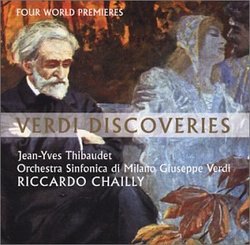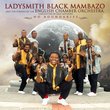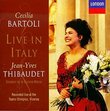| All Artists: Riccardo Chailly, Giuseppe Verdi Orchestra, Giuseppe Verdi Symphony Orchestra of Milan, Jean-Yves Thibaudet Title: Verdi Discoveries Members Wishing: 0 Total Copies: 0 Label: Decca Release Date: 9/9/2003 Genre: Classical Styles: Opera & Classical Vocal, Chamber Music, Forms & Genres, Concertos Number of Discs: 1 SwapaCD Credits: 1 UPC: 028947376729 |
Search - Riccardo Chailly, Giuseppe Verdi Orchestra, Giuseppe Verdi Symphony Orchestra of Milan :: Verdi Discoveries
 | Riccardo Chailly, Giuseppe Verdi Orchestra, Giuseppe Verdi Symphony Orchestra of Milan Verdi Discoveries Genre: Classical
|
Larger Image |
CD DetailsSimilarly Requested CDs
|
CD ReviewsPELLO CIEL MARMOREO DAVID BRYSON | Glossop Derbyshire England | 10/04/2003 (5 out of 5 stars) "For me this has been a discovery and a half. In the days before Otello Shaw claimed to find in Verdi more power than Verdi himself knew how to use. Without possessing a fraction of Shaw's acumen, I have always been fascinated by the way Verdi's idiom developed from the raw inspiration of the early operas to the sophistication and sometimes the downright strangeness of the final masterpieces without a distinct step-change such as Wagner's idiom went through after Lohengrin.
This utterly fascinating disc fills in a few of the blanks in my knowledge of him. These are numerous indeed, but the disc is going to do the same to some extent even for Verdi experts, for the simple reason that some of the items it contains are being performed for the first time. All the music here is instrumental. There is an early 5-minute `sinfonia', an adagio for trumpet and orchestra, a set of variations for oboe and orchestra that is probably only orchestrated by Verdi from a composition by one Mori (although the actual theme for the variations seems to have been Verdi's), and another set of variations with a solo bassoon where the attribution to Verdi is uncertain. What is really going to boost the sales of this record is yet another set of orchestral variations, this time with solo piano, the soloist being no less than Thibaudet. Apparently Verdi's original aspiration was to a career as a pianist. He was turned down, it also appears, on account of some unorthodox hand-position, but encouraged to pursue composition instead. Rightly or wrongly, we had a narrow escape there - but what on earth would they have thought of Horowitz's way of doing it, I can only wonder. The variations are full of anyone's brilliance, not a distinctive instrumental style as in Mendelssohn or Chopin, but I sense the enthusiasm Thibaudet surely felt when confronted with this unexpected opportunity, and near the end there are some faux-pizzicato effects from him, the sort of touch of originality that I love. The rest is various preludes from the operas that have not made it to the standard repertory. He obviously felt that he could do more with the Force of Destiny overture than here and consequently did it. Otherwise his instinct is typically to go for the dramatic jugular and cut out the purely instrumental sections beloved of his own beloved Italian tradition. It is certainly a rather strange experience to hear the familiar opening measures of Aida followed up by what is not familiar at all. The thing that above all else makes this disc compulsive and compulsory for me is the (rightly) sidelined prelude to Otello. There is a dark side to most of us, and the creator of Rigoletto shows us a bit of his - but nothing, nothing like this. This prelude brings together some elements in the work that are diluted over its length and put into a unique context of mixed musical influences. The prelude brings into sharp juxtaposition the very things that have, all my life, made Otello unlike anything for me in all music. The post-Wagnerian but utterly un-Wagnerian harmonies that resolve partly or not at all, the brutal yet calculated orchestration that looms out at us and retreats awaiting its own moment, the sheer inhuman feel from this most human and sympathetic of composers, the brainpower unleashed from behind the pretence of naivety - he splits it all up in the work as a whole and thank goodness. It starts with Iago's credo and ends with that detached, ethereal and un-erotic kiss and this prelude brings it all together. No, no, no. I'll keep it much as I would a glimpse of a dear friend who is utterly blameless and I would not have expected to have had insights like these - creative insights at that. The playing-time of the disc extends slightly beyond 80 minutes." |

 Track Listings (10) - Disc #1
Track Listings (10) - Disc #1

